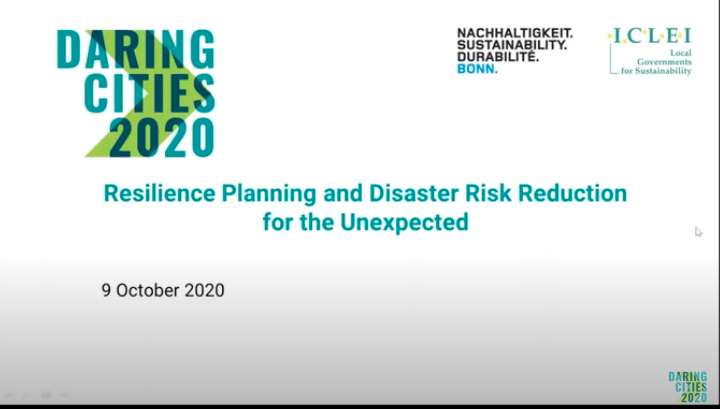
In order to access the video, you must create an account on Daringcities.org or log-in.
Cities are at the frontline of risks. Reducing existing and new risk and strengthening resilience, including risks from health emergencies, is required for urban areas, especially now given the current COVID-19 pandemic.
The sudden and unpredictable nature of urban crises often drives emergency services to react rather than respond in a more considered way. The COVID-19 crisis has exposed the limited resilience of our cities and has stressed the need to plan better to reduce risks, while focusing on post-disaster recovery and reconstruction. In a way, the crisis has been an opportunity to rethink the way we plan, design, develop and manage our cities, to make sure better prepared to protect everyone when the next emergency arises.
Local governments, cities and communities need to understand the major challenges, shocks and stresses which may impede secure, sustainable development and to develop strategies to build resilience to these challenges. The pandemic has shown the multiple dimensions and consequences of disasters and make us reflect on the traditional single hazard focus – whether it’s flooding, earthquake, typhoons, or bush fires. Urban resilience planning must understand and explore the connections between multiple and cascading hazards. Therefore, urban resilience may encompass many types of hazards, or city functions, or sectors. The planning may identify a wide range of risk types, including economy, environment, infrastructure, food or water supply, epidemic, civil unrest, and climate and disaster phenomena. Other disruptive threats with longer-term societal stresses, such as unemployment, poor access or barriers to education, crime, or homelessness should also be considered.
By creating resilience plans or by prioritizing resilience in their master and sector-specific plans, cities will be able to reduce risk and improve their resilience to unexpected and cascading disasters. This session presents cases of cities addressing multiple disasters, as well as opportunities for support to cities in planning for urban resilience.
Facilitator:
- Maryke van Staden, Interim Head of Resilience, Director of ICLEI’s carbonn Climate Center and Director of Business Development
Panelists:
- Donovan Burton, Principal Informed.City
- Steve Gawler, Director, ICLEI Oceania, on “The ICLEI approach to planning for greater resilience”
- Commissioner Brigid Shea, Precinct 2, Travis County, Texas, USA, on the “US Response, recovery, and future risk reduction to wildfire”
- Erias Lukwago, Mayor of Kampala, Uganda, on “Climate Change Adaptation Plan mainstreaming of nature-based solutions in the DRR plan and a new resilience framework focused on disaster”
- Ingrid Konrad, Chief Architect, and Eva Streberová, Project Manager, City of Bratislava, on “Climate change: a threat for cultural heritage and opportunity for increasing urban resilience in Bratislava”
- Sally Moxham, Manager Strategy and Partnerships, ICLEI Oceania
